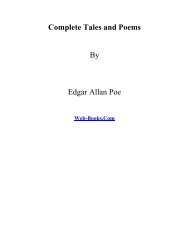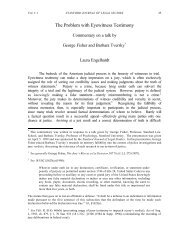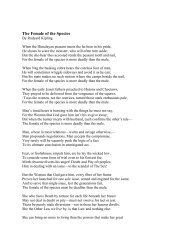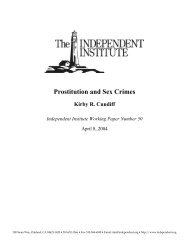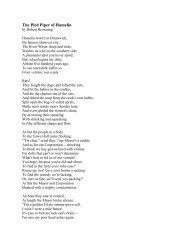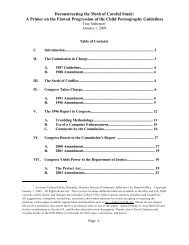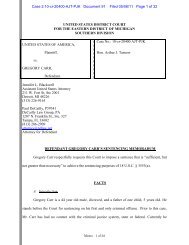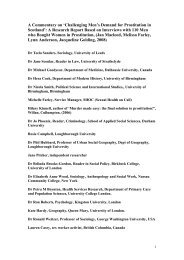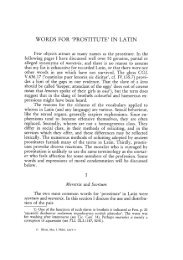- Page 1 and 2:
The Complete Sherlock Holmes Arthur
- Page 3 and 4:
Table of contents A Study In Scarle
- Page 5:
The Case-Book of Sherlock Holmes Pr
- Page 9:
Part I A Study In Scarlet Table of
- Page 13 and 14:
n the year 1878 I took my degree of
- Page 15 and 16:
hardly have given him credit. “Yo
- Page 17 and 18:
stained with chemicals, yet he was
- Page 19 and 20:
possible perfection in it. Before t
- Page 21 and 22:
“Why, that he was a retired serge
- Page 23 and 24:
great strips had become detached an
- Page 25 and 26:
dust from the floor, and packed it
- Page 27 and 28:
the dingiest and dreariest of them
- Page 29 and 30:
I recognized that justice must be d
- Page 31 and 32:
slammed behind our visitor before H
- Page 33 and 34:
“There’s more work to be got ou
- Page 35 and 36:
with a stick in his hand. “I don
- Page 37 and 38:
the mews at the back of the hotel.
- Page 39:
clever as himself. As long as this
- Page 43 and 44:
In the central portion of the great
- Page 45 and 46:
“It don’t matter. It ain’t qu
- Page 47 and 48:
of the episode. Then he turned to t
- Page 49 and 50:
was to deal with cattle, she was no
- Page 51 and 52:
At first this vague and terrible po
- Page 53 and 54:
ger which threatened them, and how
- Page 55 and 56:
So unnerved was he at the sight tha
- Page 57 and 58:
All night their course lay through
- Page 59 and 60:
his way. On the sixth day, he reach
- Page 61 and 62:
A Study In Scarlet CHAPTER VI. A Co
- Page 63 and 64:
nothing more than his paid servant,
- Page 65 and 66:
was the only memento that I had of
- Page 67 and 68:
in criminal annals. The cases of Do
- Page 69:
The Sign of the Four
- Page 73 and 74:
herlock Holmes took his bottle from
- Page 75 and 76:
the neighborhood. So much is observ
- Page 77 and 78:
clear-cut, hawklike features. “St
- Page 79 and 80:
It was half-past five before Holmes
- Page 81 and 82:
We followed the Indian down a sordi
- Page 83 and 84:
to part with, although I had got it
- Page 85 and 86:
dreamily conscious that he was pour
- Page 87 and 88:
I went up and peeped through the ke
- Page 89 and 90:
ope which I see in the corner, secu
- Page 91 and 92:
“On which the dead man very consi
- Page 93 and 94:
only led us, however, to a deeper a
- Page 95 and 96:
“There’s the print of wooden-le
- Page 97 and 98:
“Ah! it’s all right. He’s off
- Page 99 and 100:
“My dear fellow, it would be a co
- Page 101 and 102:
It may be looked upon as the very l
- Page 103 and 104:
Norwood tragedy. They all appeared
- Page 105 and 106:
The old man made a little run towar
- Page 107 and 108:
for the final escape, and hurried t
- Page 109 and 110:
the deck. It straightened itself in
- Page 111 and 112:
a matter of duty, send an inspector
- Page 113 and 114:
you came up with us. However, there
- Page 115 and 116:
doubts as to whether they could arr
- Page 117 and 118:
done up in a shawl. He seemed to be
- Page 119 and 120:
enough all day; though in the eveni
- Page 121 and 122:
up by a convict-gang in the woods.
- Page 123:
The Adventures of Sherlock Holmes
- Page 127:
A Scandal in Bohemia Table of conte
- Page 130 and 131:
the firelight strikes it, the leath
- Page 132 and 133:
“You are right,” he cried; “I
- Page 134 and 135:
groom out of work. There is a wonde
- Page 136 and 137:
He disappeared into his bedroom and
- Page 138 and 139:
We had reached Baker Street and had
- Page 141:
The Red-Headed League
- Page 144 and 145:
you know, for example, that I did m
- Page 146 and 147:
mine. He said a few words to each c
- Page 148 and 149:
shall be happy to look into it. Fro
- Page 150 and 151:
“Very well. And, I say, Doctor, t
- Page 152 and 153:
highest pitch of tension, and my he
- Page 155:
A Case of Identity
- Page 158 and 159:
“I have seen those symptoms befor
- Page 160 and 161:
said she would make it all right wi
- Page 162 and 163:
“That will do,” said Holmes.
- Page 164 and 165:
e pushed as far as it would go if a
- Page 167 and 168:
e were seated at breakfast one morn
- Page 169 and 170:
“It appears that his arrest did n
- Page 171 and 172:
Lestrade looked startled. “I do n
- Page 173 and 174:
armaid, finding from the papers tha
- Page 175 and 176:
“Who was the criminal, then?”
- Page 177:
gold, became wealthy men, and made
- Page 181 and 182:
hen I glance over my notes and reco
- Page 183 and 184:
trembling hand, ‘K. K. K.!’ he
- Page 185 and 186:
“Tut! tut!” cried Sherlock Holm
- Page 187 and 188:
looks as if they always send their
- Page 189:
He took a large sheet of paper from
- Page 193 and 194:
sa Whitney, brother of the late Eli
- Page 195 and 196:
“I was certainly surprised to fin
- Page 197 and 198:
his lodger, and that he could not a
- Page 199 and 200:
“Frankly, then, madam, I do not.
- Page 201 and 202:
drove through the streets of the Su
- Page 203:
entreated him to prevent anyone fro
- Page 207 and 208:
had called upon my friend Sherlock
- Page 209 and 210:
has been hung up indoors most of th
- Page 211 and 212:
occurrences, perhaps I ought to ask
- Page 213 and 214:
“Well?” “That’s the list of
- Page 215 and 216:
as if on some commission, and I mad
- Page 217:
The Adventure of the Speckled Band
- Page 220 and 221:
stand this strain no longer; I shal
- Page 222 and 223:
I seemed to hear a low whistle, suc
- Page 224 and 225:
the other of us, while his deep-set
- Page 226 and 227:
chairs, made up all the furniture i
- Page 228 and 229:
“Did you observe anything very pe
- Page 230 and 231:
of using a form of poison which cou
- Page 233 and 234:
f all the problems which have been
- Page 235 and 236:
of money through my poor father’s
- Page 237 and 238:
into a carriage, the door of which
- Page 239 and 240:
my own curiosity. It was obvious at
- Page 241 and 242:
“They must have done so. I have a
- Page 243:
The Adventure of the Noble Bachelor
- Page 246 and 247:
St. Simon, second son of the Duke o
- Page 248 and 249:
“A most painful matter to me, as
- Page 250 and 251:
“Still, jealousy is a strange tra
- Page 252 and 253:
Simon has not already arrived. Ha!
- Page 254 and 255:
“Then I trust that you at least w
- Page 257 and 258:
olmes,” said I as I stood one mor
- Page 259 and 260:
I should find myself! I determined,
- Page 261 and 262:
arms folded, asked me whether it wa
- Page 263 and 264:
“You heard nothing yourself last
- Page 265 and 266:
the world. Now I am left to a lonel
- Page 267:
“On entering the house, however,
- Page 271 and 272:
o the man who loves art for its own
- Page 273 and 274:
“ ‘Hampshire. Charming rural pl
- Page 275 and 276:
those all-night chemical researches
- Page 277 and 278:
drawing-room, which is a very large
- Page 279 and 280:
“There was a little passage in fr
- Page 281 and 282:
e very much surprised if this were
- Page 283:
The Memoirs of Sherlock Holmes
- Page 287 and 288:
am afraid, Watson, that I shall hav
- Page 289 and 290:
that the stranger was leaning throu
- Page 291 and 292:
“Undoubtedly. He has neither a kn
- Page 293 and 294:
Colonel Ross, who had shown some si
- Page 295 and 296:
“My friend and I return to town b
- Page 297 and 298:
“It was the first link in my chai
- Page 299:
The Yellow Face
- Page 302 and 303:
“This is Grosvenor mixture at eig
- Page 304 and 305:
set and rigid about it which was sh
- Page 306 and 307:
secret which was casting a shadow o
- Page 308 and 309:
We turned a corner in the lane as h
- Page 311:
The Stock-Broker’s Clerk
- Page 314 and 315:
“Ah! Then you got hold of the bes
- Page 316 and 317:
“ ‘Precisely what I don’t wan
- Page 318 and 319:
Following his lead, we ascended fiv
- Page 320 and 321:
family resemblance. But for the hap
- Page 323 and 324:
have some papers here,” said my f
- Page 325 and 326:
came out to say that there was a ma
- Page 327 and 328:
“My friend ascended with the doct
- Page 329 and 330:
“ ‘ “Well, where d’ye suppo
- Page 331:
him with a match-box in his hand se
- Page 335 and 336:
n anomaly which often struck me in
- Page 337 and 338:
was first taken up by my father, bu
- Page 339 and 340:
the body could we find. On the othe
- Page 341 and 342:
“From this starting-point I proce
- Page 343:
“ ‘What is it, then?’ he gasp
- Page 347 and 348:
t was some time before the health o
- Page 349 and 350:
course this Acton business has put
- Page 351 and 352:
house. You appear to take it for gr
- Page 353 and 354:
“And where was it?” “Where I
- Page 355:
“It is an art which is often usef
- Page 359 and 360:
ne summer night, a few months after
- Page 361 and 362:
her return. The blinds were not dow
- Page 363 and 364:
the curious fact that the intruder
- Page 365 and 366:
The man gave a violent start. “I
- Page 367:
The Resident Patient
- Page 370 and 371:
the portrait were framed it would j
- Page 372 and 373:
apidly to the front, and during the
- Page 374 and 375: He relit the stair gas as he spoke,
- Page 376 and 377: “Why should any one murder a man
- Page 379: The Greek Interpreter
- Page 382 and 383: of their fellows. Yet they are not
- Page 384 and 385: Sometimes the rattle of the stones
- Page 386 and 387: We all sat in silence for some litt
- Page 388 and 389: which Mr. Melas had found himself.
- Page 391: The Naval Treaty
- Page 394 and 395: and finally brought a test-tube con
- Page 396 and 397: the hall, where I found the commiss
- Page 398 and 399: had not dared to think of what woul
- Page 400 and 401: “Well, we have several, but we ca
- Page 402 and 403: “I should,” said Lord Holdhurst
- Page 404 and 405: “No, thank you, Joseph. I have a
- Page 406 and 407: the centre of it was lying a little
- Page 408 and 409: “Why did he try the window on the
- Page 411 and 412: t is with a heavy heart that I take
- Page 413 and 414: the door opened and Professor Moria
- Page 415 and 416: turned the carriage, and dashed awa
- Page 417 and 418: “I think that I may go so far as
- Page 419: seething foam, will lie for all tim
- Page 423: The Adventure of the Empty House
- Page 427 and 428: five volumes you could just fill th
- Page 429 and 430: they had always been. So it was, my
- Page 431 and 432: empty house. Holmes crouched back a
- Page 433 and 434: He had thrown off the seedy frock-c
- Page 435: The Adventure of the Norwood Builde
- Page 438 and 439: “Dear me,” said he; “it was o
- Page 440 and 441: “You can imagine, Mr. Holmes, tha
- Page 442 and 443: something for this unfortunate youn
- Page 444 and 445: My friend had no breakfast himself,
- Page 446 and 447: may possibly remember that you chaf
- Page 449: The Adventure of the Dancing Men
- Page 452 and 453: Holmes examined it for some time, a
- Page 454 and 455: exactly the same as the last one. A
- Page 456 and 457: of the Norfolk Constabulary, and he
- Page 458 and 459: approached it. The flowers were tra
- Page 460 and 461: I therefore cabled to my friend, Wi
- Page 462 and 463: “If you use the code which I have
- Page 465 and 466: om the years 1894 to 1901 inclusive
- Page 467 and 468: down my machine, but he slowed down
- Page 469 and 470: The knowledge that the girl’s sto
- Page 471 and 472: “That’s what I am asking you. Y
- Page 473: “Well, well, two of you came over
- Page 477 and 478:
e have had some dramatic entrances
- Page 479 and 480:
leaving a neighbouring station by a
- Page 481 and 482:
“Was there anything in your lette
- Page 483 and 484:
y a rider who was going from the di
- Page 485 and 486:
“The matter is very important. I
- Page 487 and 488:
school when he reached it, but went
- Page 489 and 490:
under my roof. I answer that it was
- Page 491:
The Adventure of Black Peter
- Page 494 and 495:
what do you make of that tobacco-po
- Page 496 and 497:
the murderer. I would also urge tha
- Page 498 and 499:
turned to leave the hut when Hopkin
- Page 500 and 501:
“You can’t deny that Neligan wa
- Page 502 and 503:
the coarse tobacco—all these poin
- Page 505 and 506:
t is years since the incidents of w
- Page 507 and 508:
“What I say is true,” Holmes an
- Page 509 and 510:
suit us best, but it is bolted as w
- Page 511 and 512:
I wouldn’t hurt a fly of my own a
- Page 513:
The Adventure of the Six Napoleons
- Page 516 and 517:
smashed in Dr. Barnicot’s rooms w
- Page 518 and 519:
the house, or immediately outside t
- Page 520 and 521:
“The Press, Watson, is a most val
- Page 522 and 523:
his matted hair, and once, when my
- Page 524 and 525:
I knew for certain that it was the
- Page 527 and 528:
t was in the year ’95 that a comb
- Page 529 and 530:
The lecturer unlocked the outer doo
- Page 531 and 532:
“I don’t know, sir. It didn’t
- Page 533 and 534:
“It is only a suggestion,” said
- Page 535:
The Adventure of the Golden Pince-N
- Page 538 and 539:
Holmes lit his cigar and leaned bac
- Page 540 and 541:
ight side of the neck and from behi
- Page 542 and 543:
“Very good. Mrs. Marker, you can
- Page 544 and 545:
had never known him handle a case i
- Page 546 and 547:
“You were always a noble woman, A
- Page 549:
The Adventure of the Missing Three-
- Page 552 and 553:
I am happy to say, into amateur spo
- Page 554 and 555:
with a little delicacy and finesse
- Page 556 and 557:
Armstrong. He held my friend’s ca
- Page 558 and 559:
way help Mr. Godfrey Staunton, and
- Page 560 and 561:
“I wish you to understand, in the
- Page 563 and 564:
t was on a bitterly cold and frosty
- Page 565 and 566:
in an instant. He caught me first b
- Page 567 and 568:
near them, two-thirds full, and bes
- Page 569 and 570:
without any mark of fraying whateve
- Page 571 and 572:
“Which?” “Well, I suggested a
- Page 573:
take upon myself, but I have given
- Page 577 and 578:
had intended “The Adventure of th
- Page 579 and 580:
Holmes wrote a name upon a slip of
- Page 581 and 582:
would, in any case, have turned my
- Page 583 and 584:
Godolphin Street, Westminster. Our
- Page 585 and 586:
here, MacPherson. Let these gentlem
- Page 587 and 588:
telling me frankly the real meaning
- Page 589:
The Hound of the Baskervilles
- Page 593 and 594:
. Sherlock Holmes, who was usually
- Page 595 and 596:
practitioner. He was a very tall, t
- Page 597 and 598:
low, for they say that the words us
- Page 599 and 600:
May Sir Charles had declared his in
- Page 601 and 602:
“What was the use?” “How was
- Page 603 and 604:
strange, peering, absent-minded fas
- Page 605 and 606:
who has spent most of his time in t
- Page 607 and 608:
“Nothing,” said he, throwing it
- Page 609 and 610:
get the number? No. 2704 is our man
- Page 611 and 612:
“What do you make of it yourself?
- Page 613 and 614:
into which all these strange and ap
- Page 615 and 616:
there are one or two other neighbou
- Page 617 and 618:
“No, no, the Yew Alley is on the
- Page 619 and 620:
“I heard it distinctly, and I am
- Page 621 and 622:
with those. And Holmes had expressl
- Page 623 and 624:
“Why, you had not very much time
- Page 625 and 626:
unfruitful soil. I am no antiquaria
- Page 627 and 628:
trust that they do not mean that I
- Page 629 and 630:
But when I came to think the matter
- Page 631 and 632:
you as an agent—that you do not r
- Page 633 and 634:
“Then get your revolver and put o
- Page 635 and 636:
strange inhabitants remains as insc
- Page 637 and 638:
my wife. Only a few weeks ago she w
- Page 639 and 640:
to be quit of it all on the day tha
- Page 641 and 642:
“Do you think a woman could go al
- Page 643 and 644:
along the same path at the same hou
- Page 645 and 646:
For a moment or two I sat breathles
- Page 647 and 648:
the man who had owned it—the name
- Page 649 and 650:
came Selden, in the darkness, to kn
- Page 651 and 652:
will have to undergo to-morrow, whe
- Page 653 and 654:
“I hope that you will come also.
- Page 655 and 656:
in Little Russia, in the year ’66
- Page 657 and 658:
A sound of quick steps broke the si
- Page 659 and 660:
It was evident to us that all pursu
- Page 661 and 662:
Vandeleurs found it convenient to c
- Page 663 and 664:
can be traced for several years, as
- Page 665:
The Valley Of Fear
- Page 669:
PART I. The Tragedy of Birlstone
- Page 672 and 673:
“What do you make of it, Holmes?
- Page 674 and 675:
I was staring at the strange messag
- Page 676 and 677:
indorsed the high opinion formed of
- Page 678 and 679:
you can bring Mr. Holmes, please do
- Page 680 and 681:
ound the old village with his pipe
- Page 682 and 683:
The dead man’s right arm was thru
- Page 684 and 685:
with the deliberate intention of co
- Page 686 and 687:
should have done it some other way.
- Page 688 and 689:
or heard. They had then rushed out
- Page 690 and 691:
“What do you mean by ‘appears
- Page 692 and 693:
“Where are the slippers now?”
- Page 694 and 695:
she is lying also. They are both ly
- Page 696 and 697:
“I propose to go up there present
- Page 698 and 699:
Next morning, after breakfast, we f
- Page 700 and 701:
“Now sign that, and send it by ha
- Page 702 and 703:
hint which you conveyed to me throu
- Page 704 and 705:
On the other hand, I brought a bit
- Page 707 and 708:
It was the fourth of February in th
- Page 709 and 710:
these evenings. But mind my words:
- Page 711 and 712:
McMurdo was a man who made his mark
- Page 713 and 714:
The girl sank her face into her han
- Page 715 and 716:
work mixing drinks for the loungers
- Page 717 and 718:
fists, or, if that won’t satisfy
- Page 719 and 720:
“Just the same old Teddy Marvin,
- Page 721 and 722:
“Dear Sir: “There is a job to b
- Page 723 and 724:
Freeman, and of these he was given
- Page 725 and 726:
friend. Afterwards he read the Dail
- Page 727 and 728:
to it. I expect you meant kindly by
- Page 729 and 730:
Needless to say that they were disc
- Page 731 and 732:
than she had ever been since Jack M
- Page 733 and 734:
him again and again. He had screame
- Page 735 and 736:
his men were undisturbed by such re
- Page 737 and 738:
come right down to the waiting room
- Page 739 and 740:
As McMurdo had said, the house in w
- Page 741 and 742:
“Ay,” said Baldwin, catching hi
- Page 743 and 744:
that the light went for a time out
- Page 745:
His Last Bow
- Page 749:
The Adventure of Wisteria Lodge
- Page 753 and 754:
The Adventure of Wisteria Lodge CHA
- Page 755 and 756:
on the grass-grown drive in front o
- Page 757 and 758:
“On the face of it the case is no
- Page 759 and 760:
man had opened the door, the candle
- Page 761 and 762:
Baynes, who has the case in hand, t
- Page 763 and 764:
was a woman. Who then but Miss Burn
- Page 765 and 766:
same reasons for revenge. He could
- Page 767:
The Adventure of the Cardboard Box
- Page 770 and 771:
“So far I could hardly have gone
- Page 772 and 773:
dissecting-rooms, it would be as ea
- Page 774 and 775:
Tottenham Court Road for fifty-five
- Page 776 and 777:
seated upon a chest with his head s
- Page 778 and 779:
“ ‘Well, Sarah found that she c
- Page 781:
The Adventure of the Red Circle Tab
- Page 784 and 785:
landlady had handed to him, “this
- Page 786 and 787:
“Well, what am I to do, Mr. Holme
- Page 788 and 789:
“Holmes!” he cried. “Why, Gre
- Page 790 and 791:
Half an hour later we were seated,
- Page 793:
The Adventure of the Bruce-Partingt
- Page 796 and 797:
All other men are specialists, but
- Page 798 and 799:
“Yes; his brother, Colonel Valent
- Page 800 and 801:
“That should be helpful, Watson,
- Page 802 and 803:
“Did you close it?” “I am alw
- Page 804 and 805:
the roof of the train. That was cle
- Page 806 and 807:
“For England, home and beauty—e
- Page 808 and 809:
“That will do very well. I shall
- Page 811 and 812:
s. Hudson, the landlady of Sherlock
- Page 813 and 814:
scream. As I turned I caught a glim
- Page 815 and 816:
stood upon a side table. ”Among t
- Page 817 and 818:
will turn it up, that I may see you
- Page 819:
The Disappearance of Lady Frances C
- Page 822 and 823:
live, and their passbooks are compr
- Page 824 and 825:
An hour afterwards, Sherlock Holmes
- Page 826 and 827:
answered. ‘It took longer, being
- Page 828 and 829:
died—certificate says senile deca
- Page 831:
The Adventure of the Devil’s Foot
- Page 834 and 835:
church. The vicar of the parish, Mr
- Page 836 and 837:
two great apes. Oh, it was awful to
- Page 838 and 839:
asking Holmes in an eager voice whe
- Page 840 and 841:
tion between three things—the bur
- Page 842 and 843:
“What do you mean?” he asked at
- Page 844 and 845:
Holmes sat for some little time in
- Page 847 and 848:
t was nine o’clock at night upon
- Page 849 and 850:
“Sparking plugs, eh?” “You se
- Page 851 and 852:
these things? Steiner is the fifth
- Page 853 and 854:
I have long had an eye upon him. Mi
- Page 855:
The Case-Book of Sherlock Holmes
- Page 859:
The Illustrious Client
- Page 862 and 863:
“No, it is more serious than that
- Page 864 and 865:
am glad to have had my attention ca
- Page 866 and 867:
“None of that, Mr. Holmes,” cri
- Page 868 and 869:
I have my plans. The first thing is
- Page 870 and 871:
“Very mysterious,” said he with
- Page 872 and 873:
“It is a loyal friend and a chiva
- Page 875 and 876:
he ideas of my friend Watson, thoug
- Page 877 and 878:
the table. He looked up at last wit
- Page 879 and 880:
“I really took no notice.” “P
- Page 881 and 882:
took out my notebook and scribbled
- Page 883:
then, had to be sifted and balanced
- Page 887 and 888:
t was pleasant to Dr. Watson to fin
- Page 889 and 890:
Watson waited until the door was cl
- Page 891 and 892:
Ikey Sanders, who refused to cut it
- Page 893 and 894:
villains staggered back in utter am
- Page 895:
The Adventure of the Three Gables
- Page 898 and 899:
“But what is it?” “I was goin
- Page 900 and 901:
“Settled once again,” said Holm
- Page 902 and 903:
“It seems a queer thing to break
- Page 904 and 905:
away, and were, I admit, a little r
- Page 907 and 908:
olmes had read carefully a note whi
- Page 909 and 910:
So the matter stands. She is now co
- Page 911 and 912:
original yeoman farmer of the seven
- Page 913 and 914:
The boy cooed and nestled his head
- Page 915:
The Adventure of the Three Garrideb
- Page 918 and 919:
“Why did he ever drag you into it
- Page 920 and 921:
“Now and again I drive down to So
- Page 922 and 923:
know my Watson by now. But there is
- Page 924 and 925:
castle in the air fell down, it bur
- Page 927 and 928:
omewhere in the vaults of the bank
- Page 929 and 930:
“I know you have,” our visitor
- Page 931 and 932:
The Gold King paused for a moment a
- Page 933 and 934:
to a side-gate opening into the gro
- Page 935 and 936:
“Perhaps Mr. Neil Gibson has told
- Page 937 and 938:
I had no glimmer of what was in his
- Page 939:
The Adventure of the Creeping Man
- Page 942 and 943:
his master, save on very special oc
- Page 944 and 945:
love affair. He made a journey abro
- Page 946 and 947:
Sulkily our host—if I may call hi
- Page 948 and 949:
egan after his visit to Prague, tha
- Page 951:
The Adventure of the Lion’s Mane
- Page 954 and 955:
was blood dripping down his chin, f
- Page 956 and 957:
Murdoch’s face flushed with anger
- Page 958 and 959:
to be in a nightmare in which you f
- Page 960 and 961:
of rocks lay above it at the base o
- Page 963:
The Adventure of the Veiled Lodger
- Page 966 and 967:
she cried. It was in the night, and
- Page 968 and 969:
“I learned it when I had recovere
- Page 971:
The Adventure of Shoscombe Old Plac
- Page 974 and 975:
Holmes raised his eyebrows. “This
- Page 976 and 977:
“Exactly!” Holmes had become ve
- Page 978 and 979:
enewed activity. Once more we found
- Page 980 and 981:
of the coffins of her husband’s a
- Page 983 and 984:
herlock Holmes was in a melancholy
- Page 985 and 986:
“Well, he was painting the passag
- Page 987 and 988:
malevolent scowl. None the less, he
- Page 989:
observed it. You’ll get results,



